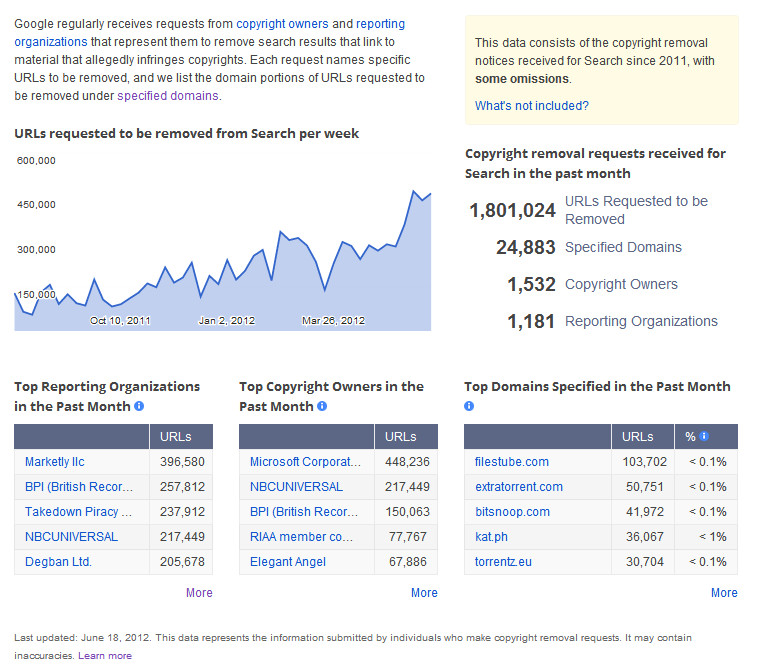Google transparency – new data shows increase in link removal requests

What we’ve seen over the past couple years has been troubling, and today is no different. When we started releasing this data in 2010, we also added annotations with some of the more interesting stories behind the numbers. We noticed that government agencies from different countries would sometimes ask us to remove political content that our users had posted on our services. We hoped this was an aberration. But now we know it’s not, Dorothy Chou, senior policy analyst for Google, wrote on her blog on June 18, 2012.
She continues, about two years ago, we launched our interactive Transparency Report. We started by disclosing data about government requests. Since then, we’ve been steadily adding new features, like graphs showing traffic patterns and disruptions to Google services from different countries. And just a couple weeks ago, we launched a new section showing the requests we get from copyright holders to remove search results.
This is the fifth data set that we’ve released. And just like every other time before, we’ve been asked to take down political speech.
It’s alarming not only because free expression is at risk, but because some of these requests come from countries you might not suspect—Western democracies not typically associated with censorship.
For example, in the second half of last year, Spanish regulators asked us to remove 270 search results that linked to blogs and articles in newspapers referencing individuals and public figures, including mayors and public prosecutors. In Poland, we received a request from a public institution to remove links to a site that criticized it. We didn’t comply with either of these requests.
In addition to releasing new data today, we’re also adding a feature update which makes it easier to see in aggregate across countries how many removals we performed in response to court orders, as opposed to other types of requests from government agencies. For the six months of data we’re releasing today, we complied with an average of 65 percent of court orders, as opposed to 47 percent of more informal requests. Read her blog post here.
Some of the examples that Google gave include:
- Spain requested the removal of 270 links to blogs and newspaper articles about individuals and public figures, including mayors and public prosecutors.
- Poland’s Enterprise Development Agency wanted a search result that criticized it, plus eight links to the page, taken down.
- Canada’s passport office asked for the removal of a YouTube video showing a man urinating on his Canadian passport and flushing it down the toilet.
- Brazil’s electoral court ordered the removal of four social network profiles featuring political content.
- A German government agency obtained a court order for the removal of 898 search results linking to pages containing statements about the agency and one of its employees that were deemed not credible.
- Pakistan’s Ministry of Information technology wanted deleted six YouTube videos that satirized the Pakistan Army and senior politicians. – Read complete examples here.
In following report, they disclose the number of requests received from each government in six-month period (July – December 2011) with certain limitations.
Governments ask companies to remove content for many different reasons. For example, some content removals are requested due to allegations of defamation, while others are due to allegations that the content violates local laws prohibiting hate speech or pornography. Laws surrounding these issues vary by country, and the requests reflect the legal context of a given jurisdiction.
| Court Orders | Other Requests (Executive, Police, etc.) | |||||
|---|---|---|---|---|---|---|
 Country
|
Requests | Compliance  |
Items  |
Requests | Compliance  |
Items  |
| Total | > 467 | – | > 7000 | > 561 | – | > 4979 |
|
39
|
97%
|
247
|
7
|
86%
|
19
|
|
|
–
|
–
|
–
|
–
|
–
|
–
|
|
|
6
|
17%
|
633
|
11
|
45%
|
13
|
|
|
4
|
100%
|
22
|
–
|
–
|
–
|
|
|
<10
|
100%
|
<10
|
10
|
70%
|
11
|
|
|
<10
|
100%
|
<10
|
–
|
–
|
–
|
|
|
128
|
69%
|
397
|
66
|
26%
|
157
|
|
|
–
|
–
|
–
|
–
|
–
|
–
|
|
|
4
|
50%
|
137
|
15
|
67%
|
25
|
|
|
–
|
–
|
–
|
–
|
–
|
–
|
|
|
–
|
–
|
–
|
<10
|
50%
|
<10
|
|
|
1
|
100%
|
10
|
–
|
–
|
–
|
|
|
–
|
–
|
–
|
–
|
–
|
–
|
|
|
–
|
–
|
–
|
<10
|
33%
|
<10
|
|
|
–
|
–
|
–
|
<10
|
0%
|
<10
|
|
|
–
|
–
|
–
|
<10
|
0%
|
<10
|
|
|
–
|
–
|
–
|
–
|
–
|
–
|
|
|
–
|
–
|
–
|
–
|
–
|
–
|
|
|
12
|
67%
|
22
|
19
|
47%
|
39
|
|
|
60
|
80%
|
1,304
|
43
|
72%
|
418
|
|
|
–
|
–
|
–
|
–
|
–
|
–
|
|
|
–
|
–
|
–
|
–
|
–
|
–
|
|
|
<10
|
80%
|
<10
|
96
|
26%
|
246
|
|
|
<10
|
0%
|
<10
|
–
|
–
|
–
|
|
|
–
|
–
|
–
|
–
|
–
|
–
|
|
|
<10
|
0%
|
<10
|
3
|
33%
|
77
|
|
|
20
|
70%
|
45
|
8
|
50%
|
51
|
|
|
4
|
50%
|
20
|
<10
|
0%
|
<10
|
|
|
–
|
–
|
–
|
<10
|
0%
|
<10
|
|
|
–
|
–
|
–
|
<10
|
100%
|
<10
|
|
|
–
|
–
|
–
|
–
|
–
|
–
|
|
|
–
|
–
|
–
|
–
|
–
|
–
|
|
|
–
|
–
|
–
|
–
|
–
|
–
|
|
|
–
|
–
|
–
|
<10
|
0%
|
<10
|
|
|
–
|
–
|
–
|
<10
|
100%
|
<10
|
|
|
–
|
–
|
–
|
<10
|
0%
|
<10
|
|
|
–
|
–
|
–
|
<10
|
0%
|
<10
|
|
|
<10
|
100%
|
<10
|
<10
|
0%
|
<10
|
|
|
<10
|
100%
|
<10
|
–
|
–
|
–
|
|
|
1
|
100%
|
10
|
2
|
50%
|
13
|
|
|
–
|
–
|
–
|
2
|
50%
|
15
|
|
|
–
|
–
|
–
|
<10
|
0%
|
<10
|
|
|
–
|
–
|
–
|
–
|
–
|
–
|
|
|
–
|
–
|
–
|
2
|
0%
|
10
|
|
|
<10
|
100%
|
<10
|
–
|
–
|
–
|
|
|
–
|
–
|
–
|
–
|
–
|
–
|
|
|
<10
|
0%
|
<10
|
<10
|
33%
|
<10
|
|
|
<10
|
0%
|
<10
|
–
|
–
|
–
|
|
|
–
|
–
|
–
|
<10
|
0%
|
<10
|
|
|
–
|
–
|
–
|
–
|
–
|
–
|
|
|
–
|
–
|
–
|
94
|
80%
|
249
|
|
|
18
|
78%
|
24
|
25
|
8%
|
283
|
|
|
–
|
–
|
–
|
–
|
–
|
–
|
|
|
<10
|
100%
|
<10
|
–
|
–
|
–
|
|
|
7
|
100%
|
65
|
<10
|
100%
|
<10
|
|
|
–
|
–
|
–
|
8
|
0%
|
27
|
|
|
–
|
–
|
–
|
4
|
100%
|
149
|
|
|
22
|
64%
|
104
|
23
|
48%
|
70
|
|
|
<10
|
100%
|
<10
|
–
|
–
|
–
|
|
|
12
|
58%
|
97
|
37
|
54%
|
750
|
|
|
117
|
40%
|
3,851
|
70
|
44%
|
2,341
|
|
|
–
|
–
|
–
|
–
|
–
|
–
|
|

Last month Google announced it was receiving more than one million requests a month from copyright owners seeking to pull their content from the company’s search results.
Fred von Lohmann, Google’s senior copyright counsel, said copyright infringement was the main reason Google had removed links from search terms.
He said the company had received a total of 3.3m requests for removals on copyright grounds last year, and was on course to quadruple that number this year. The company complied with 97% of requests.

Sources: google.com/transparencyreport, googleblog.blogspot.com

This is a great article. (reposting)
In the UK the Daily Mail has been doing a series on Google spying (mapping cameras) –
‘Google will know more about you than your partner’: Uproar as search giant reveals privacy policy that will allow them to track you on all their products
http://www.dailymail.co.uk/sciencetech/article-2091508/Google-privacy-policy-Search-giant-know-partner.html
Their website ‘search’ box gives all their great articles on query term “google”.
[…] https://watchers.news/2012/06/19/google-transparency-new-data-shows-increase-in-link-remo… […]
[…] The Watchers – Google transparency – new data shows increase in link removal requests. Share this:TwitterFacebookLike this:LikeBe the first to like this. Leave a […]